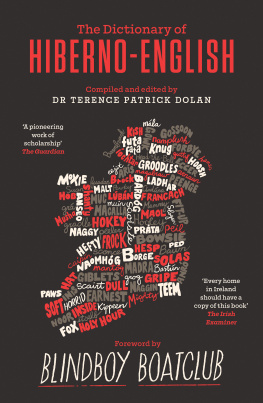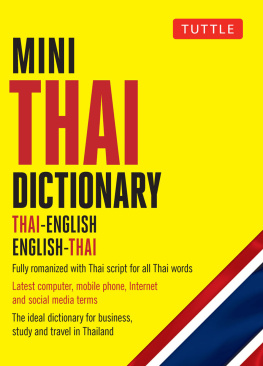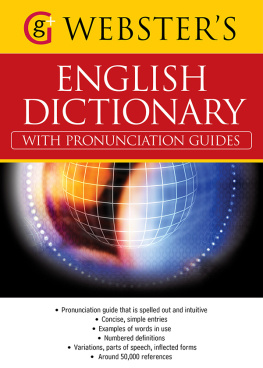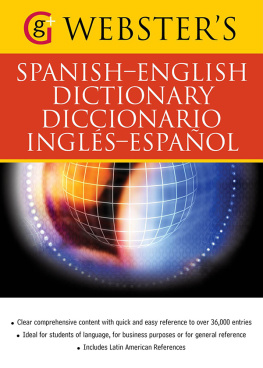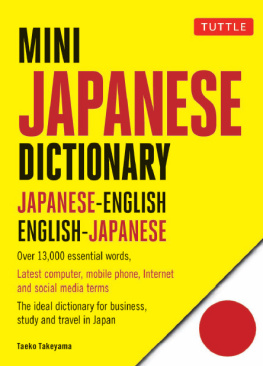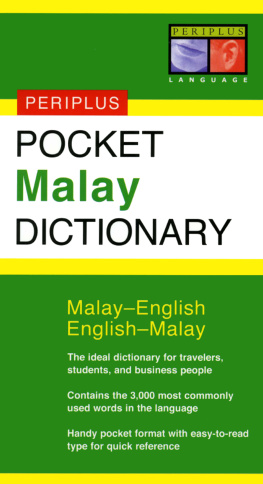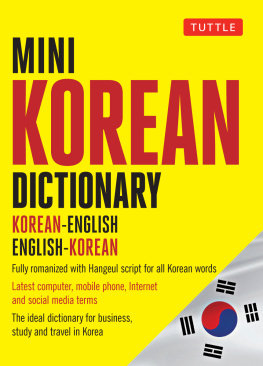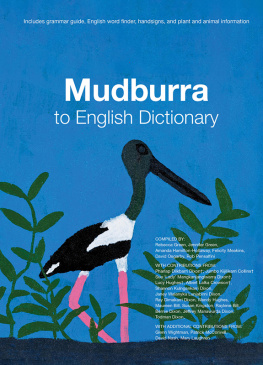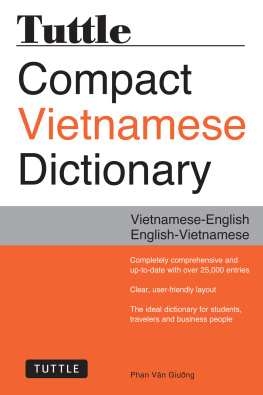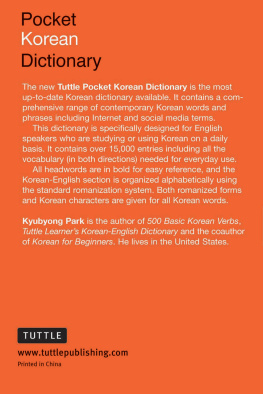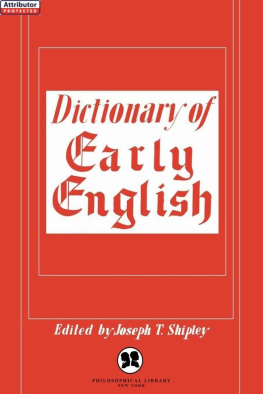Dolan Terence Patrick - A Dictionary of Hiberno-English
Here you can read online Dolan Terence Patrick - A Dictionary of Hiberno-English full text of the book (entire story) in english for free. Download pdf and epub, get meaning, cover and reviews about this ebook. publisher: Gill Books, genre: Religion. Description of the work, (preface) as well as reviews are available. Best literature library LitArk.com created for fans of good reading and offers a wide selection of genres:
Romance novel
Science fiction
Adventure
Detective
Science
History
Home and family
Prose
Art
Politics
Computer
Non-fiction
Religion
Business
Children
Humor
Choose a favorite category and find really read worthwhile books. Enjoy immersion in the world of imagination, feel the emotions of the characters or learn something new for yourself, make an fascinating discovery.
- Book:A Dictionary of Hiberno-English
- Author:
- Publisher:Gill Books
- Genre:
- Rating:3 / 5
- Favourites:Add to favourites
- Your mark:
- 60
- 1
- 2
- 3
- 4
- 5
A Dictionary of Hiberno-English: summary, description and annotation
We offer to read an annotation, description, summary or preface (depends on what the author of the book "A Dictionary of Hiberno-English" wrote himself). If you haven't found the necessary information about the book — write in the comments, we will try to find it.
A Dictionary of Hiberno-English — read online for free the complete book (whole text) full work
Below is the text of the book, divided by pages. System saving the place of the last page read, allows you to conveniently read the book "A Dictionary of Hiberno-English" online for free, without having to search again every time where you left off. Put a bookmark, and you can go to the page where you finished reading at any time.
Font size:
Interval:
Bookmark:

Contents
A Dictionary of Hiberno-English
The Irish Use of English
THIRD EDITION
Compiled and edited by
TERENCE PATRICK DOLAN
GILL BOOKS
Compiler and Editor
Professor Terence Dolan was Emeritus Professor of English at the National University of Ireland, Dublin, and a Hastings Senior Scholar and Junior Dean of The Queens College, Oxford, before going to UCD where he was Co-ordinator of Research in the School of English, Drama and Film. He was a Fellow of The Royal Society of Arts. He was Founding Director of the UCD American Junior Year Abroad Programme and Director of the International James Joyce Summer School. He has written and produced two promotional videos on the UCD Faculty of Arts, one featuring the late Dermot Morgan (Father Ted). Twice he was appointed the US National Endowment for the Humanities Distinguished Visiting Professor at the University of Richmond, Virginia (1986 and 1992). In 1992, he was Jefferson Smurfit Fellow at the University of Missouri-Rolla. He was a well-known broadcaster on Irish national radio stations (RT Radio and Newstalk) and was also broadcast regularly on BBC Radio 4.
Trained in Oxford, he is an internationally distinguished lexicographer and is author of A Dictionary of Hiberno-English,The Irish Use of English, with editions published in 1998, 1999, 2004, 2006, 2012 and 2013. He published and lectured widely on Hiberno-English and on Medieval English literature, including Geoffrey Chaucer, on whom he collaborated with former Python, Terry Jones. He was a contributor to the Oxford Companion to Irish History and the Oxford Dictionary of National Biography. He was an External Examiner for doctorates at Trinity College Dublin and at the Sorbonne, and gave seminars and delivered papers on Hiberno-English and Medieval English literature at the Universities of Pennsylvania, Philadelphia, Georgetown, Cairo, So Paulo, Leuven, London, Paris-Sorbonne, Beijing, Nanjing, Halle-Wittenberg, Munich, Regensburg, Copenhagen, Potsdam, Veliko Tarnovo, Oslo, Amsterdam, Seattle, Antwerp, Lige, Dijon, Helsinki, Joensuu, Nova Scotia, Utrecht and Harvard, among others. In 1996, in order to mark Irelands presidency of the European Union, he was invited to lecture on Hiberno-English in Brussels and Luxembourg. He was Plenary Lecturer, with Colum McCann, at the USIreland Forum in New York in 2007. As one of the leading authorities on Hiberno-English, he was invited to address a delegation of the European Parliament in 2012. He died in 2019, leaving behind a lasting legacy of the study and research of Hiberno-English.
Gill Books
Hume Avenue
Park West
Dublin 12
www.gillbooks.ie
Gill Books is an imprint of M.H. Gill and Co.
Terence Patrick Dolan 1998, 1999, 2004, 2006, 2012, 2013, 2020
978 07171 9020 1 (hardback)
978 07171 9074 4 (ebook)
First edition published in hard cover 1998; in paperback 1999
Second edition published in hard cover 2004; in paperback 2006
Third edition published in hard cover 2012; in paperback 2013
This edition published in 2020
Print origination by Carrigboy Typesetting Services
All rights reserved.
No part of this publication may be copied, reproduced or transmitted in any form or by any means, without written permission of the publishers.
A CIP catalogue record for this book is available from the British Library.
5 4 3 2 1
For my brother James and in memory of our mother Brigid
Editor: Terence Patrick Dolan
Senior research assistant: John Loftus
Irish-language research assistant: Mirad N Eithir
Special consultants: Terence Killeen (Finnegans Wake)
Carmel Scott (phonetics)
The late Fr Martin Kenny (Irish-language idioms)
Kathleen Moynihan (lexicon)
Sen Mathna (lexicon)
Frances McCormack (lexicon)
Feargal Murphy (linguistics)
Thorsten Eisbein (technology)
Sarah Scarlett Schneider (research and lexicon collation)
Stephanie Brennan (phonetics and presentation of text)
Shane Moran (field research)
Tamami Shimada (Creole Englishes)
Wagner Venancio (newcomer Hiberno-English)
Foreword
When I was a youngfla of about six or seven, the neighbours had a Yank cousin called Jake over to visit. He was sound enough and had toys of the Turtles, which Id never seen in Ireland. One day I says to him, Are you going to the shop, you are?, and Jake gets a pure bowsy look across his lip, like I was trying to pull the piss. Why are you telling me to go to the shop? Ill go to the shop if I want to, he says. I was only asking, I wasnt telling you to go to the shop, Jake, I said back. Id no idea what had gotten him upset.
My da was over by the gate listening in with a smirk. Later on he says to me, That thing earlier with the young Yank, when he thought you told him to go to the shop? Do you know why he couldnt understand you? My da then explained to me a theory about the way Irish people speak English, a theory which was given to him by his da.
My granda lived on a bithrn below in West Cork that was on the way to a creamery. He was a member of Tom Barrys IRA flying column and would constantly watch and take note of whoever passed. Regular Irish people would traverse with their horses loaded with buckets of fresh milk and would come back with horses packed with butter in their saddlebags. This was a brisk, fast-paced road, no time to stop and chat, as milk would go sour in the sun and butter would soften on a horses shoulders. It was for this reason that British soldiers would stop and harass anyone who walked the bithrn: to interrogate, to rile, to get horses pure greasy with sweaty yellow butter. A small injustice, a show of power, and an opportunity to make a person emotional enough to lash out and say the wrong thing.
My granda would notice that when an English soldier questioned a man on the way to the creamery, no answer would be right or wrong; any answer meant a long wait and your papers inspected regardless. The standard rules of human interaction had broken down, and to give an answer as Gaeilge would be met with violence. So, the Irish people figured out an in-between. A yes and no at the same time. A quantum superposition of an answer. An answer that would cause the soldier to say, Stupid Paddy gibberish and usher the person off before the butter melted down the horses shoulders. And this here was my das theory as to why I asked the American, Are you going to the shop, you are? It was an absurd post-colonial way of arranging a question that had its roots in years of interrogation from the English.
Now, Im not saying thats the case. This is merely a story that was passed down to me. But, as an adult, I learned that there was a name for how I speak, how I arrange sentences and for the words I use. Hiberno-English: a resistant way of speaking the English language, a language we never asked for.
As an author and a musician, I often find myself writing words as if they are music. I search for melody and rhythm on the page. Jazz and blues are African American forms of music, born out of the resistance of African songs to European instruments. Musical notes exist in the African scale that do not exist in the Western scale. These notes are in between the Western notes, and these in-between notes give jazz and blues an emotional complexity that the traditional Western scale cannot deliver. The playful, bowld and fluid way that Hiberno-English resists traditional English does the same thing. This improvised musicality to how we think and speak provides me with a deep literary confidence to explore the in-between, especially when the writing process presents me with resistance.
Font size:
Interval:
Bookmark:
Similar books «A Dictionary of Hiberno-English»
Look at similar books to A Dictionary of Hiberno-English. We have selected literature similar in name and meaning in the hope of providing readers with more options to find new, interesting, not yet read works.
Discussion, reviews of the book A Dictionary of Hiberno-English and just readers' own opinions. Leave your comments, write what you think about the work, its meaning or the main characters. Specify what exactly you liked and what you didn't like, and why you think so.

